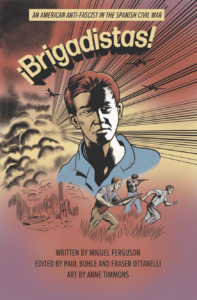Book Review: A New Graphic Novel on the ALB
 ¡Brigadistas! An American Anti-Fascist in the Spanish Civil War, by Miguel Ferguson. Edited by Paul Buhle and Fraser Ottanelli. Art by Anne Timmons. New York: Monthly Review Press, 2022. 116 pp.
¡Brigadistas! An American Anti-Fascist in the Spanish Civil War, by Miguel Ferguson. Edited by Paul Buhle and Fraser Ottanelli. Art by Anne Timmons. New York: Monthly Review Press, 2022. 116 pp.
Graphic novels are increasingly popular conduits for approaching historical subjects on both sides of the Atlantic. Readers may recall “Paul Robeson in Spain,” which appeared in June 2009 of The Volunteer, as a harbinger of this new mode of dramatizing the past. In Spain, several artists have published extremely well received works, such as Carlos Giménez’s Paracuellos, Antonio Altarriba’s El arte de volar (The Art of Flying), Antonio Zapico’s La balada del Norte (The Ballad of the North), or Pablo Durá’s La Brigada Lincoln, which narrates the experience of American volunteers in Spain.
It was only a question of time before more U.S. authors joined this trend. Miguel Ferguson has taken up the challenge in his graphic novel loosely based on the life of Lincoln volunteer Abe Osheroff. The crisp black and white drawings are the work of Anne Timmons. Former ALBA board chair Fraser Ottanelli has penned a succinct introduction, while Paul Buhle contributes an afterword.
The effort to educate a wider American audience about these men and women who crossed the Atlantic between 1936 and 1938 to fight a first battle against fascism in Spain is laudable. Although the three thousand or so American men and women were a varied and colorful group, one difficult to portray, this graphic novel accomplishes its objective. The author has managed to include several of the emblematic episodes of Lincoln history, such as the S.S. Bremen incident in New York, the sinking of the Ciudad de Barcelona, Oliver Law as commander of the Lincoln battalion, and even Ernest Hemingway at the Hotel Florida (although it is mistakenly located in Barcelona).
Still, the author’s decision to merge the experiences of several veterans into Abe’s story, while good for narrative efficiency, hurts the novel’s historical accuracy. The main character seems invincible—a superhero of sorts who vanquishes the villain Nazi German officer Streicher in a personal duel, with hardly a Spanish fascist mentioned in the script. The superhero also has a noble romantic interest: his girlfriend, who resented being left behind in New York, ultimately volunteers to join Abe in Spain, serving as a nurse. Along the way, the author makes numerous erroneous geographical references and mistakes in Spanish. Worse, he falls into the old mythic script that portrays all those in the IB ranks as “idealists and writers,” more amorphous dreamers than the political activists that many of them were. Frankly, this does more to tarnish the image of the brigaders than the factual mistakes in the text. Abe’s comrades in the novel are whiners.
While it is true that American volunteers were known to gripe, the Lincolns were nevertheless disciplined activists. They understood the value of following orders. They withstood the shortages in weapons and supplies of the beleaguered Spanish Republic. They became stalwart elements of the Spanish Popular Army in its 33-month long struggle against a coup led by a rebellious fascist officer corps with the generous assistance of Nazi Germany, Fascist Italy, Spanish landowners, monarchists and the Catholic Church. In this sense, the whining volunteers in this novel who constantly complain of lack of food, weapons, and sleep—and who oddly never quite seem to don uniforms—are quite the opposite of the determined antifascists of 1937.
Of course, this work is fiction, so it may be unfair to hold such a text to the rigors of historical study. Quoting Osheroff, Ferguson says he seeks to “bend but not break the rubber band of truth.” In the end, the story of the Lincolns in Spain may just be too vast (or complicated?) for a 100-page graphic novel. Yet because his good intentions lead the author to attempt to squeeze too much into the book, the storyline strays from important issues. Perhaps a more effective option would have been to limit the story to the authentic Abe Osheroff, a great activist and humanitarian who did not need to be reflected as a comic book superhero. Still, if this graphic novel serves to kindle interest in the Spanish Civil War and the International Brigades among a wider, younger audience, its publication must be saluted.
Robert S. Coale is Professor of Hispanic Studies at the Université de Rouen-Normandie in France and a member of the Board of ALBA.












